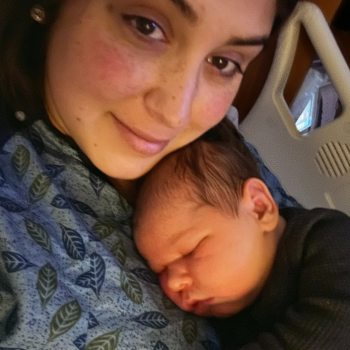1746812639.png)
A Call For HELLP
May 09, 2025 By Laura Mondragon
1746812760.png)
It started as a normal day in my 31st week of pregnancy. I woke up, went to the bathroom, and began to brush my teeth. When toothpaste started dribbling out of my mouth, I realized I could not move the left side of my face. Worried I'd had a stroke, I called my doctor's office. At the nurse's advice, I went straight to the ER, where my blood pressure was significantly elevated. But I was just "nervous," the nurse assured me.
Luckily, I hadn't had a stroke; I was diagnosed with Bell's palsy. The ER doctor prescribed steroids and sent me home.
I wasn't just nervous.
Over the next week, I gained 10 pounds. My feet and legs swelled to twice their normal size. Extreme exhaustion made it a struggle to get out of bed, but searing heartburn made it impossible for me to sleep. Even bland foods gave me unbearable indigestion.
Crippled by pain and fatigue, I thought, "This is what it must feel like when you are dying." Yet it never occurred to me that that's what was actually happening. I attributed my symptoms to the third trimester of pregnancy and the steroids. But deep down, I knew something was very wrong.
At my next OB appointment, my blood pressure was still elevated. An ultrasound showed the baby was OK but the amniotic fluid was getting low. The doctor ordered some tests and told me to come back in a few days.
That night, pain started shooting through my eyes. My blood pressure was consistently over 155/105, and the on-call midwife urged me to come in to labor and delivery. I thought I'd have a few tests and go home.
By the time I arrived at the hospital, my headache had become excruciating. My blood pressure continued to climb. I was hooked up to an IV with magnesium sulfate to prevent seizures while I awaited my bloodwork results.
The labs showed my liver enzymes were more than 12 times normal levels and my kidneys were operating at less than 50%, among other abnormal results. I was diagnosed with severe preeclampsia and HELLP syndrome, life-threatening complications of pregnancy.
I'd need to deliver via C-section within a day or two, they told me. At 33 weeks pregnant, I was terrified. This was not supposed to happen. They gave me a steroid shot to help mature the baby's lungs and would monitor me throughout the night.
Early the next morning, my OB said I'd need to deliver. "When?" I asked, thinking it would be later that day, or perhaps the next morning. "Right now," he said. Moments later, I was in the OR. Thankfully, my son was born healthy and would be in excellent care in the NICU.
But that wasn't the end of my journey.
A host of additional complications followed. My potassium levels became critically high, which could have led to cardiac arrest. I developed disseminated intravascular coagulation (DIC), a life-threatening blood-clotting problem. And my blood sugar spiked to dangerous levels.
This is where things started to get blurry. The magnesium sulfate I was given to prevent seizures had reached toxic levels. A sea of people came and went. They all seemed scared. Despite being severely lethargic, I discerned that I was being transferred to the ICU.
“Am I dying?” I thought.
Thanks to the collaborative efforts of several medical teams — to whom I will be eternally grateful — I started to recover. Things were looking up. But when the staples in my incision were removed, something unexpected happened: I started leaking. For weeks, I would need to be attached to a portable machine to drain the fluid.
After a harrowing week in the hospital, I was finally going home. But something was missing: my son. He was in great hands, but they weren't mine. I felt empty without him. Two weeks later, I had the wound-draining machine removed, and my husband and I brought our beautiful son home.
My story has a happy ending, but others aren't so lucky. If you experience symptoms that worry you, speak up. Work with a doctor you trust. It could be the difference between life and death.

My perfect daughter, Katie, gave birth to her first child just eight days before she passed away due to postpartum complications. Her deliver...
ReadMore- Josiah May 29, 2025
- Maribeth’s Story May 29, 2025
- Healthy 37 Year Old Passes Away From Post Delivery Complications- Hellp Syndrome May 29, 2025
- Pre Eclampsia Journey May 29, 2025
- My Preeclampsia Story May 23, 2025
- Brianna’s Hellp Syndrome Story May 23, 2025
- I Never Knew Preeclampsia Could Occur Postpartum Until It Happened To Me May 23, 2025
- Opal’s Pre-E Journey May 23, 2025
- Post-Partum Preeclampsia? Probably Pre-Birth Too May 23, 2025
- A Story Of Strength May 23, 2025
